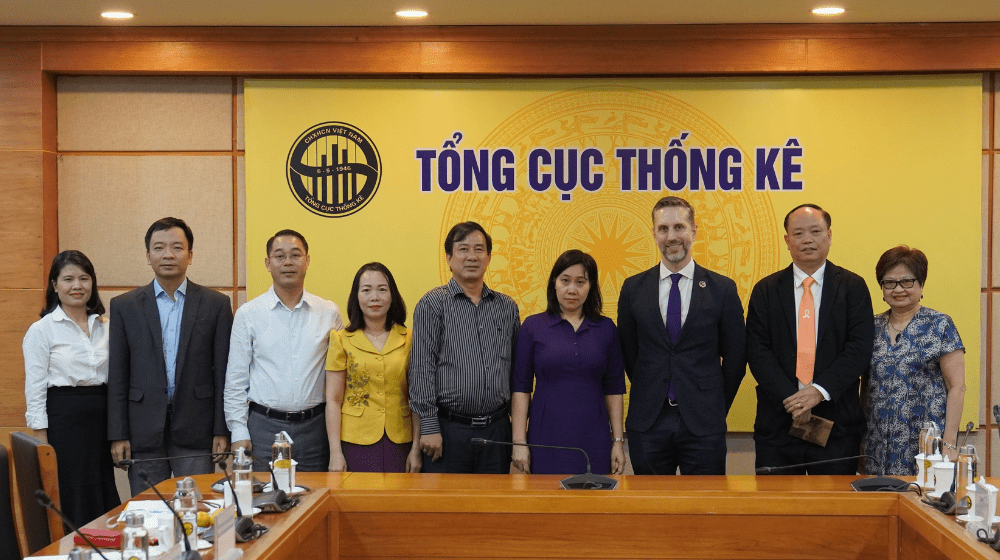Reporter: For nearly 50 years, UNFPA has been supporting the General Statistics Office and the statistics sector in Vietnam. As the General Statistics Office is going to conduct the 2024 Intercensal Population and Housing Survey, will you please share us an overview of UNFPA's cooperation and support as well as your recommendations for better statistical work in Vietnam?
Matt Jackson: UNFPA has worked in partnership with the General Statistics Office of Vietnam for nearly 50 years. This has produced some remarkable steps forward in quality population data. In particular, UNFPA supported all five population and housing censuses, conducted every ten years from 1979 to 2019. With a shared goal of "Better Data - Better Lives", UNFPA has supported Member States including Vietnam to ensure the quality of population censuses and surveys in accordance with international standards through capacity building for national statistical agencies on data collection, analysis and utilisation to achieve socio-economic growth.
Under the framework of its 10th Country Programme (2022 – 2026) UNFPA continues to support the General Statistics Office through a 5-year project “Supporting Viet Nam in the production and utilisation of quality population data and evidence for the evaluation, formulation and implementation of the country's socio-economic development policies, strategies, plans and monitoring of Sustainable Development Goals”. This project aims to support Viet Nam in applying new information and communication technology in data collection, analysis, and dissemination, and in the development of evidence-based policies, strategies, and programmes to achieve the set targets in Viet Nam’s Socio-Economic Development Strategy 2021-2030, the Socio-Economic Development Plan 2021-2025, and the National Action Plan 2030 agenda for sustainable development. These are strategic planning documents that require a reliable statistical data system to serve the monitoring, supervision and evaluation of progress in implementing the goals.
Progress has been achieved in collecting information and data - Viet Nam now needs to focus on improving disaggregated data on population, especially ethnicity and age which offer important evidence for policy makers to address challenges related to inequalities. In addition, the utilisation of administrative data such as civil registration and vital statistics and further in-depth population analysis drawing on different data sources such as population surveys, informal data and big data will help to provide a better understanding of the factors that affect population changes. Data sharing among Government’s ministries and agencies, localities and non-government partners is also key yet there remains a lack of rules and common practices on data sharing and exchange.
To narrow these gaps, the General Statistics Office and other ministries and agencies have established and strengthened national population databases. These include, among others, the national population database managed by the Ministry of Public Security and the Civil Registration and Vital Statistics system managed by the Ministry of Justice. These databases still need time to fully mature not least as many national sustainable development indicators still rely on data collected by different types of population surveys. As a result, Viet Nam needs to continue to conduct population surveys to improve its databases and provide timely data for evidence-based policy making.
Population and Housing Censuses and surveys are also an excellent opportunity to explore digital transformation and innovation for data technologies and communication platforms as this helps to speed up data generation processes and minimise human errors. Viet Nam’s aim is for a centralised and unified national statistical database system, linking all existing statistical database systems, especially from administrative data sources.
A recent example of in-depth, thematic analysis is the General Statistics Office’s work, with technical and financial support from UNFPA, on Vietnam's National Transfer Account (NTA) report, published in December last year. This is a comprehensive and systematic method used to analyse the economic life cycle of population ageing. Findings of the NTA research help to identify the status of human resources as well as the level of government’s investment, thereby providing information for national macro policy planning. NTA is also a reliable source of international reference data when talking about Vietnam at the global level.
Any Development Plan or Strategy must be based on quality population data. High economy countries often use comprehensive, inter-connected data systems that are accessible to citizens, business, civil society, Government ministries and Parliament. In addition, data transparency contributes to developing strategic policies and programmes, enhancing management capacity, improving service quality, and maximising all resources for socio-economic development.

Reporter: The General Statistics Office will kick off the 2024 Inter - Population Census Survey on April 1, 2024. What do you think about this Survey and please share with us UNFPA’s support in this regard?
Matt Jackson: Vietnam has the 15th largest population in the world with over 100 million people. Successful population and housing censuses in recent years demonstrate the very high technical and organisational capacity of the General Statistics Office from national to local levels.
Preparations for the 2024 Inter-Population Census Survey have included pre-testing the survey’s methods, developing inventory diagrams and pre-testing questionnaires with small groups. The Survey will apply Computer-Assisted Personal Interviews which were initially used when conducting the 2019 Population and Housing Census. Our hope is that the findings of the 2024 survey will be published later this year.
The 2024 Inter–Population Census Survey plays a significant role in Viet Nam’s rapid socio-economic growth. Reliable and quality statistics are needed to formulate, implement, monitor and assess the Viet Nam’s progress in achieving its socio-economic ambitions and the Sustainable Development Goals (SDG) targets to ensure we leave no one behind. In particular, the inter-population census survey is expected to support updated evidence on at least 20 important national SDG indicators. This includes the reproductive history of women, education, death, migration, imbalance of sex ratio at birth, disability, marriage including child marriage and customary marriage, education, labour forces and housing which are not currently available in other population databases. The survey will also help to update national population projections for 2069 including on population ageing.
I hope that this survey will also help the General Statistics Office to draw lessons learnt about data and statistical collection including how best to maximise technologies for conducting population surveys in the future as well as how to enhance data sharing and use among related stakeholders. With GSO’s solid experience in running large scale surveys, I believe that the IPS will be conducted in a smooth manner ensuring the confidentiality of all information collected.
UNFPA remains committed to supporting Vietnam and the General Statistics Office with their ambition for better quality data. Our support will also focus on enhancing the capacity of Viet Nam's data and statistics experts through sharing best practice and exchanges with leading experts around the world.
(Interview with UNFPA Representative, March 2024, published here)



